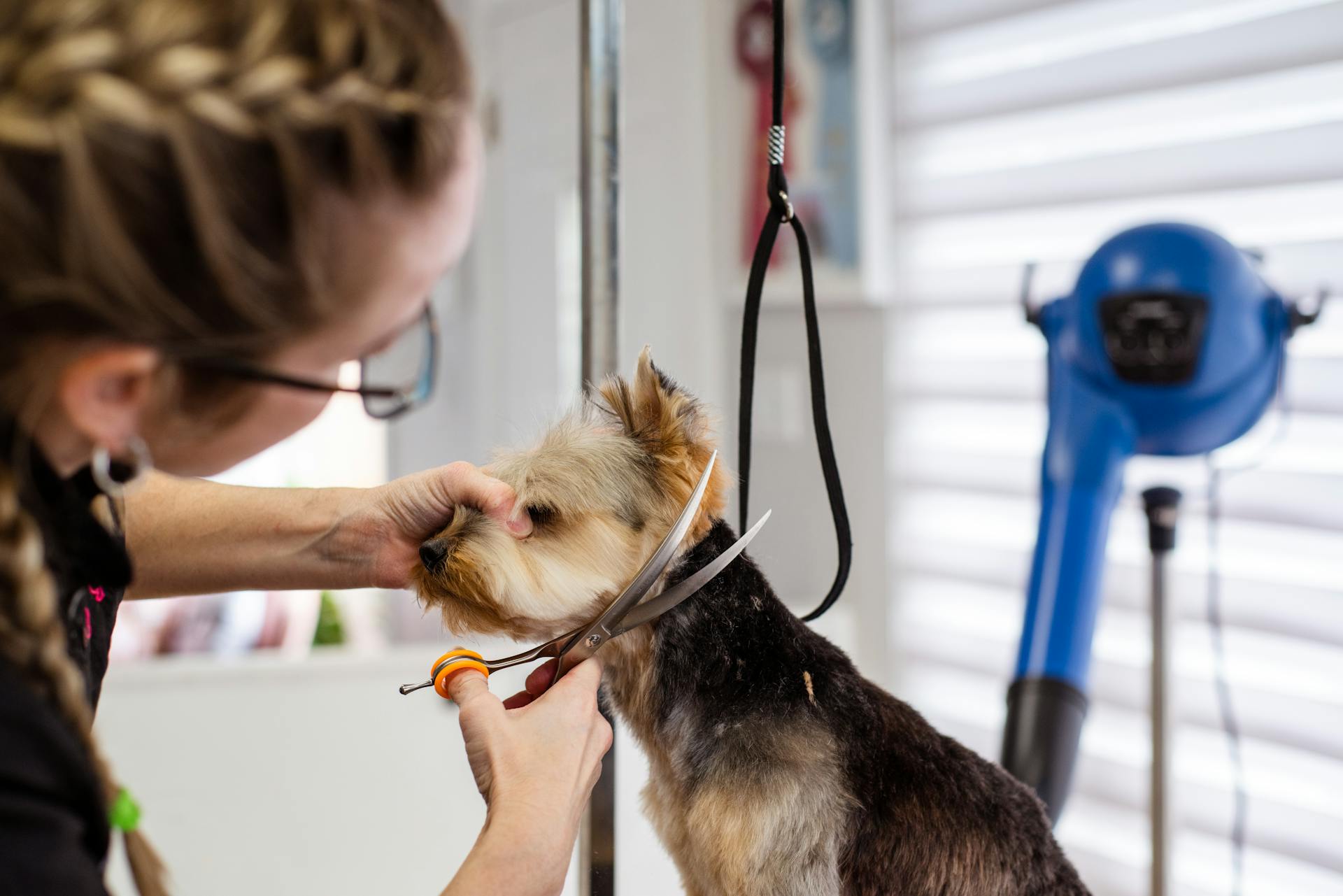
Starting a dog daycare business requires careful planning, and one of the essential steps is to define your target market. This involves identifying the demographics of your ideal customer, such as age, income, and lifestyle.
Research suggests that dog owners between the ages of 25 and 45 with a medium to high income are more likely to use dog daycare services. They often have busy schedules and require a safe and reliable place for their pets to stay while they are away.
To effectively serve this market, it's crucial to understand their needs and preferences. For instance, many dog owners prioritize their pets' safety and well-being above all else, so it's essential to provide a secure and comfortable environment for their dogs.
Business Planning
A good business plan for a dog daycare must cater to the unique aspects of pet care services. It's essential to provide a comprehensive overview of the pet care market, including current statistics and emerging trends.
Your business plan should articulate your vision clearly, defining your target market and your daycare's distinctive offerings. This can range from specialized care for different breeds to additional grooming services or behavioral training.
A well-crafted business plan will not only help you to define your strategy and approach but also to attract investors or secure loans. Lenders and investors are looking for a thorough market analysis, sound financial projections, and a clear operational strategy for managing a dog daycare.
Here are some key points to consider in your business plan:
- Articulate your vision and goals
- Define your target market and unique offerings
- Conduct a thorough market analysis
- Develop a clear operational strategy
- Include sound financial projections
By presenting a detailed and substantiated plan, you show your dedication and preparedness for running a successful dog daycare.
How to Draft a Great
Drafting a great business plan is crucial for any entrepreneur, and it's essential to understand the unique aspects of pet care services, like in a dog daycare center. A good business plan must cater to the specific needs of pet owners.
Worth a look: Hot Dog Cart Business
To start, provide a comprehensive overview of the pet care market, including current statistics and emerging trends. This will help you understand the demand for dog daycare services and the competitive landscape. A clear vision is also essential, defining your target market and distinctive offerings.
Market analysis is critical, and you need to thoroughly understand the local demand for dog daycare services, the competitive landscape, and the preferences of dog owners in your area. This will help you tailor your services to meet their needs.
The operational plan should outline the facility's location, the design of the play and rest areas, the staffing requirements, and the daily care routines. It's also essential to discuss partnerships with veterinary services and pet food suppliers.
Quality of care is paramount in a dog daycare, and your plan should emphasize your commitment to animal welfare, staff training, and adherence to pet care regulations.
Here are the key components of a dog daycare business plan:
- Market analysis
- Operational plan
- Quality of care
- Marketing and sales strategies
- Financial section
A well-crafted business plan will not only help you define your strategy and approach but also attract investors or secure loans. Lenders and investors are looking for a thorough market analysis, sound financial projections, and a clear operational strategy for managing a dog daycare.
Determining Product and Service Prices
As you're planning your business, it's essential to determine the prices for your products and services. Decide on what services you'll offer, such as housing pets while they're away or providing additional value like grooming.
Research your competition to understand the market and identify gaps in the services offered. For example, if there are 6 pet groomers in your area but only 2 boarding kennels and no doggy daycares, consider setting yourself apart by offering a doggy daycare.
Don't forget to research your competitors' pricing to avoid over or undercharging. Unless you're providing exceptional value, it may be challenging to set your prices at the high end of the market as a new business.
Review your operating expenses and start-up costs to evaluate the market and set a fair price for your services. This will help you avoid undercutting the competition and ensure you're making a profit.
Related reading: Dog Boarding Business Make
Market Analysis
The global pet care market is valued at over $200 billion, with a significant portion of that coming from dog daycare services. This industry is growing rapidly as more people consider their pets as part of their families.
In the United States alone, there are thousands of dog daycare facilities, generating billions of dollars annually. This underscores the importance of dog daycare services in American society and the economy.
To successfully launch a doggy daycare facility, it's crucial to understand the demand for such services in your area. Conduct market research to find out how many pet owners in your community have a need for dog daycare services.
Existing daycare facilities in your area can provide valuable information about the market. Research their strengths and weaknesses to create a more competitive business plan.
Value Proposition
Our dog daycare business is built around providing a reliable, caring, and stimulating environment for dogs of all breeds and sizes.
We understand the concerns of pet owners and the importance of a dog's well-being, which is why we're dedicated to providing a service that supports both.
Our commitment to quality care, socialization, and exercise ensures that each dog enjoys a fulfilling daycare experience.
We aim to build a community of satisfied pet owners who feel confident that their pets are not only looked after but are also developing positively in terms of behavior and social skills.
We strive to be more than just a daycare; we want to be a place where dogs can thrive and where pet owners can find support, advice, and a network of fellow dog lovers.
We offer a variety of services, including playtime, exercise sessions, and rest periods, all supervised by our experienced and caring staff.
Our dedication to pet wellness and happiness allows us to foster a strong bond with our clients and their furry family members.
We prioritize transparency and open communication with pet owners, providing them with peace of mind that their beloved dogs are in good hands.
Our value proposition is centered around providing a safe, fun, and nurturing environment for dogs, coupled with convenience and peace of mind for their owners.
We offer our services through our physical daycare center and additional amenities such as pick-up and drop-off services.
Our well-trained staff and pet-friendly facilities are key resources that enable us to provide high-quality care for our canine clients.
Project Development
Project Development is a crucial step in creating a successful dog daycare business. A well-designed project presentation is essential to communicate your vision and goals to potential investors, partners, and customers.
Our dog daycare project is designed to cater to the needs of pet owners who are seeking a safe, engaging, and nurturing environment for their dogs while they are at work or away.
A business plan is essential for any business, including a doggy daycare, and should include goals, target market, financial projections, and a detailed description of how you plan to operate your business.
Our goal is to become a trusted partner for pet owners, providing peace of mind that their beloved dogs are in good hands and enjoying their day to the fullest. This requires a thorough understanding of our target market and their needs.
A well-written and thorough business plan will help you secure funding and attract investors if needed, and should include a marketing strategy that outlines how you plan to attract and retain customers.
To ensure the success of our dog daycare business, we will develop a strategic plan to achieve our goals, including future expansion plans such as opening new locations, expanding our services, or partnering with other businesses.
Marketing Strategy
Our marketing strategy is built on trust and community engagement. We aim to connect with dog owners by showcasing our commitment to their pets' well-being and highlighting the benefits of our daycare services.
We'll create engaging social media content featuring the dogs in our care, just like we mentioned in our marketing strategy section. This will help us build a strong brand image and communicate it effectively to our target audience.
To promote our services and attract new customers, we'll partner with local businesses. This approach has been effective in other dog daycare centers, and we're confident it will work for us too.
We'll also implement a referral program to encourage word-of-mouth recommendations from satisfied clients. This will help us build a loyal customer base and increase our chances of success.
Our marketing strategy will leverage targeted online advertising to reach pet owners in our area. We'll emphasize the convenience, reliability, and loving attention we provide to every dog, just like we plan to do with our online ads.
If this caught your attention, see: What Were You Just Doing with the Dog?
Financial Planning
Starting a dog daycare business requires a solid financial plan to ensure its long-term viability. Developing a comprehensive financial plan is crucial for this purpose. This plan should include estimates of your start-up costs, operating expenses, and revenue projections.
Your initial expenses for a dog daycare include leasing or purchasing a suitable facility, adapting the space, and obtaining necessary licenses and insurance. Additionally, you'll need to purchase equipment, create a brand, and launch targeted marketing campaigns.
A thorough analysis of local demand for dog care services is essential for making informed revenue assumptions. This includes taking into account the increasing number of pet owners and the trend towards pet humanization.
Your projected income statement will show expected revenues from your dog daycare services, minus the costs of operations and other expenses. This will give you a forecasted net profit, which is essential for assessing the long-term viability of your business.
The projected balance sheet will reflect your assets, such as facility improvements and equipment, and liabilities, including loans and anticipated operating expenses. This will provide a snapshot of your financial health at the end of each fiscal period.
Here are some key performance indicators to monitor:
- Average revenue per dog
- Occupancy rate of your daycare and boarding services
- Customer retention rate
These metrics will help you measure the financial performance and overall success of your dog daycare.
Regulations and Licenses
Starting a dog daycare business requires navigating a range of regulations and licenses. You'll need to obtain a business license, which is typically required for any business operating within a specific jurisdiction.
You may also need to register your business with the state or federal government. This can be a straightforward process, but it's essential to get it right to avoid any issues down the line.
Zoning laws are another crucial aspect to consider. Make sure your chosen location for the dog daycare is zoned for commercial use, and that you have all the necessary permits to operate a business there.
Insurance is also a must-have for any business, including a dog daycare. You'll need to have liability insurance to protect yourself and your business in case of accidents or injuries.
Here are some key licenses and permits you'll need to obtain:
- Business license
- Pet care facility permit
- Health department inspections
Your facility must also meet all relevant building codes, including those related to safety, sanitation, and accessibility. This will help ensure a safe and healthy environment for both the dogs and your staff.
You'll need to design and maintain your facility to provide a safe and comfortable environment for the dogs in your care. This includes requirements for temperature, ventilation, lighting, and access to clean water and food.
Staffing requirements will also vary depending on the size of your facility and the number of dogs in your care. Be sure to check local regulations for specific requirements.
Worth a look: Dog Daycare Requirements
Facility and Staffing
Choosing the right location for your dog daycare business is crucial to its success. Look for a spacious and easily accessible location that is safe for dogs to run and play. Ensure that the facility is well-equipped with indoor and outdoor play areas, restrooms, sleeping areas, and a designated area for food and water.
Readers also liked: Dog Play
The facility must meet all relevant building codes, including those related to safety, sanitation, and accessibility. This is a non-negotiable aspect of running a dog daycare business. The facility must also be designed and maintained to provide a safe and comfortable environment for the dogs in your care.
To ensure the well-being of the dogs, you'll need to hire experienced and qualified staff. Look for individuals who are passionate about working with dogs and have the skills and experience to provide proper care for them. A staff-to-dog ratio is also crucial, and will depend on the size of your facility and the number of dogs in your care.
Start-up Costs
Start-up costs can be a significant investment for a dog daycare business, but it's essential to consider the long-term benefits.
Investing in high-quality equipment upfront can save you from constantly replacing items due to wear and tear.
This can make a good first impression on customers and ensure a safe and comfortable environment for the dogs.
The total value of the package, including equipment, can be calculated by adding together the values of the package, which is $905.
Location and Facilities
Choosing the right location for your dog daycare business is crucial to its success. You'll want to find a spacious and easily accessible location that is safe for dogs to run and play.
Facility regulations are also important to consider. Your facility must meet all relevant building codes, including those related to safety, sanitation, and accessibility.
A well-equipped facility is essential for providing a comfortable environment for the dogs in your care. This includes indoor and outdoor play areas, restrooms, sleeping areas, and a designated area for food and water.
Some key questions to ask yourself when considering a location include:
- How much space do you need?
- Will you have space to expand?
- Will your pet business be home based or will you need to find another location?
- Check your local ordinances, does your city allow you to operate a boarding business at home? What about your HOA? Neighbors?
- Is there existing structure or will you need to build?
- What is the local market like?
- What is the impression of area you intend to place the business?
Remember to investigate local laws, regulations, permits, licensing, and insurance requirements. You'll likely need a kennel license and vendor license, so be sure to contact your state, city, and county offices regarding licensing and taxes for new businesses.
If this caught your attention, see: Dog Daycare License Requirements
Staffing and Training
Hiring experienced and qualified staff is crucial for the success of your doggy daycare. They should be passionate about working with dogs and possess the necessary skills and experience to provide proper care.
You'll need to employ people who are able to handle the physical demands of the job and can work well in a team. This includes individuals who are experienced in handling dogs.
Developing policies and procedures for how dogs will be cared for is crucial for the success of your doggy daycare. These policies should include guidelines for feeding, exercise, and behavior management.
Providing regular training and workshops to your staff is essential to ensure they're up-to-date with the latest techniques and best practices in dog care. This will help them stay on top of their game and provide the best possible care for the dogs.
Launch and Operations
As you prepare to launch your dog daycare business, it's essential to have a solid understanding of the operational regulations you'll need to follow.
First and foremost, you'll need to ensure that all dogs in your care are up-to-date on their vaccinations, and you may be required to provide proof of vaccination for each dog.
To maintain a healthy environment, regular health screenings are a must, including checks for parasites, fleas, and other signs of illness or disease.
Dogs in your care must be provided with regular exercise and opportunities for socialization with other dogs, so make sure to have a plan in place for this.
You'll also need to keep detailed records of each dog in your care, including information about vaccinations, health screenings, and any incidents or injuries that occur.
Here are some key operational regulations to keep in mind:
- Vaccination requirements: All dogs must be up-to-date on their vaccinations.
- Health screenings: Regular health screenings are necessary to maintain a healthy environment.
- Exercise and socialization: Dogs must be provided with regular exercise and opportunities for socialization.
- Record-keeping: Detailed records must be kept for each dog in your care.
To ensure compliance with all laws and regulations, be sure to obtain necessary licenses and permits, and create policies and procedures for your business.
Frequently Asked Questions
How profitable is a dog boarding business?
Dog boarding businesses typically have an average profit margin of around 10%, but actual profitability can vary significantly depending on factors like location and operational efficiency. Understanding these factors is key to maximizing profits in this industry.
Who is the target market for dog daycare?
The target market for dog daycare is typically older pet owners with extra income and time to pamper their pets, often without children at home. They are looking for convenient and luxurious pet care options.
How to set up doggy day care in the UK?
To set up a doggy day care in the UK, you'll need to obtain a licence and meet essential requirements such as staffing, space, and animal welfare standards. Start by familiarising yourself with the necessary regulations and guidelines to ensure a safe and enjoyable experience for both dogs and their owners.
Sources
- https://dojobusiness.com/blogs/news/dog-daycare-free-business-plan-example
- https://avvale.co.uk/pages/dog-daycare-business-plan-template
- https://easybusypets.com/blog/starting-a-dog-daycare-everything-you-need-to-know
- https://www.wysiwash.com/articles/animal-care/starting-a-doggy-daycare-or-kennel-business
- https://www.pawsdogdaycare.com/Start-Up-Services/costsstartupbiz.htm
Featured Images: pexels.com


